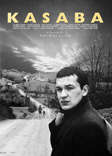
|
|
THE TOWN
(Kasaba)
By Deborah Young, July 20, 1998
A remarkable first feature from director Nuri Bilge Ceylan, "The Town" is a
strikingly original, vibrantly sensitive look at an extended family living in a
remote Turkish village. Following its premier in Berlin's Forum in February,
pic won multiple kudos in the National Competition of the recent Istanbul fest,
including the Fipresci (international critics jury) prize, which on this
occasion carried a $ 30,000 check. Further fest prospects are bright for this
very personal, refined work, which in many ways recalls the craftsmanship and
sensitivity of the best Iranian films.
Structured around the four seasons -rather than narrating a story per se- pic
opens in wintertime. In a simple but riveting schoolroom scene, a young
teacher, distractedly gazing out the window, has his young pupils read from a
patriotic textbook extolling the rules of social life and the family as the
nucleus of Turkish society.
Ceylan begins to introduce conflicts in this happy picture with subdued irony.
The teacher criticizes Asiye's mother for sending her to school with a lunch
that has gone bad and smells. A grinning country boy arrives late covered in
ice after his trek to school. There is a strong feeling of compassion for the
young, the poor, the humiliated.
Next, it's springtime. Asiye and her little brother walk home through the
cornfields, stopping to play in a graveyard. Ceylan's B&W camera beautifully
captures the feeling of the natural world -a mule, a turtle, trees, wind in
the leaves- which is also a world of discovery and childhood cruelty.
This section smoothly segues to a summer night, with the kids sitting around
an outdoor fire with their parents, grandparents and cousin eating roast corn.
Here the adult world takes over in a lengthy conversation that touches on war,
death, hunger, starvation, work and reputation. Dialogue and camerawork stay
right on the mark, revealing more and more about the family and its place in
the world. Pic closes with a section set at home, showing the symbolic dreams
of the young people and their becoming part of society.
Shoestring shooting (director did his own cinematography) in no way detracts
from what the film wants to say and lends it great intimacy. Cast is non-pro,
chosen from Ceylan's own family, while script is based on his sister Emine's
autobiographical story, "Cornfield."
|

